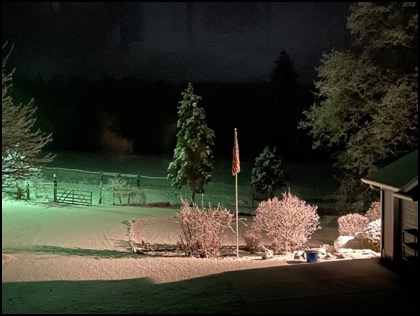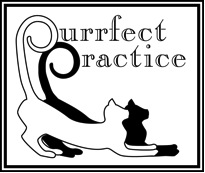February 2023
Sun, Clouds, Snow and Trees
24/02/23 16:32 Filed in: Berlin Community | Photography
Another overnight snow storm though not as heavy as the last one. We did get some early morning sun peeping through the clouds to backlight the snowy Douglas Fir trees. It was a lovely sight to see and photograph!


Comments
The Man Most Needed
22/02/23 12:06 Filed in: History | Current Affairs
Today is the anniversary of George Washington's Birthday. It comprises a holiday with Lincoln's birthday earlier to make up President's Day holiday. Washington's reputation has taken hits in recent years. He is thought in the opinion of this blogger the most needed or indispensable man for his time as a military leader then President. He gave up the power of being king as some of his contemporaries wished him to be, to resign and retire to his home on the Potomac.
Here is more information from a blog article from Powerline.
Today we celebrate the anniversary of the birth of George Washington. Of all the great men of the revolutionary era to whom we owe our freedom, Washington’s greatness was the rarest and the most needed. At this remove in time, it is also the hardest to comprehend.
Take, for example, Washington’s contribution to the Constitutional Convention of 1787. Washington’s mere presence lent the undertaking and its handiwork the legitimacy that resulted in success. The convention’s first order of business was the election of a presiding officer. Washington was the delegates’ unanimous choice.
Here is more information from a blog article from Powerline.
Today we celebrate the anniversary of the birth of George Washington. Of all the great men of the revolutionary era to whom we owe our freedom, Washington’s greatness was the rarest and the most needed. At this remove in time, it is also the hardest to comprehend.
Take, for example, Washington’s contribution to the Constitutional Convention of 1787. Washington’s mere presence lent the undertaking and its handiwork the legitimacy that resulted in success. The convention’s first order of business was the election of a presiding officer. Washington was the delegates’ unanimous choice.
Boris Pasternak Sonnet
21/02/23 15:09 Filed in: Current Affairs
Douglas Murray, one of my favorite current writers and historian, is posting over the next year a column on Free Press with Bari Weiss. Murray did an excellent video series called Uncancelled. This current column started off well. He focused on Boris Pasternak, an excellent Russian author, who lived in Stalinist times and survived.
Here is the story of his reply of one number, 30, and how it likely saved his life and energized other Russians who understood the meaning. There is more to his article and story of this Shakespeare sonnet…
Two foundational stories stick in my own mind. I will tell the second one next week, but I will start with an event that took place in Moscow in 1937.
That year’s annual Soviet writers’ congress took place in the worst time of the purges. At the major show trials in Moscow, people were confessing to things they could not possibly have done. Both the journalist Malcolm Muggeridge and the author Fitzroy Maclean, who observed these events, were credited with the line “I can believe everything except the facts.”
The people who got public show trials were comparatively lucky: at least the absurdity of the excuse for their murder was made public. Other people disappeared all the time with nothing heard of them again.
It was a dangerous time to be a private citizen, but an even worse time to be a public one. So the writers’ congress that year included a lot of very dull, regime-prescribed speeches praising the virtues of Leninist–Stalinism, Stalinist–Leninism, and so on. It was the sort of occasion to which all artists were subjected through that era: a ritual of forced humiliation. A way of getting everyone to collude in the world of lies.
Boris Pasternak was one of the most famous writers in the country. Though he had not yet completed Doctor Zhivago—the novel that would make him internationally famous—in that hall, that year, everybody knew him. And Pasternak faced a challenge. He could not speak, and he couldn’t not speak. Stalin’s secret police chief Lavrentiy Beria and his men were literally standing by the side of the stage. If Pasternak spoke, he could be disappeared. If he didn’t speak, he could be disappeared. So he stayed silent. It was on the third and final day of the conference that the writer’s friends persuaded him that the silence was madness. He had to speak. So finally, Pasternak got up to the lectern.
Everybody knew who he was, of course. He was tall, and strikingly handsome. As he pulled himself up to his full height he said not a word but a number. The number was “30.” As he said it, all two thousand writers in the hall got to their feet, and—with Pasternak—began to recite.
Thirty is the number of the Shakespeare sonnet beginning, “When to the sessions of sweet silent thought I summon up remembrance of things past.” Today the line may be best known for giving C. K. Scott Moncrieff the title for his English translation of Proust’s masterpiece about lost time. But the Russian writers in that hall all knew Pasternak had himself done a translation of the sonnet into Russian. It was already a classic. Those who know his translation say it is as beautiful as the original.
Here is the story of his reply of one number, 30, and how it likely saved his life and energized other Russians who understood the meaning. There is more to his article and story of this Shakespeare sonnet…
Two foundational stories stick in my own mind. I will tell the second one next week, but I will start with an event that took place in Moscow in 1937.
That year’s annual Soviet writers’ congress took place in the worst time of the purges. At the major show trials in Moscow, people were confessing to things they could not possibly have done. Both the journalist Malcolm Muggeridge and the author Fitzroy Maclean, who observed these events, were credited with the line “I can believe everything except the facts.”
The people who got public show trials were comparatively lucky: at least the absurdity of the excuse for their murder was made public. Other people disappeared all the time with nothing heard of them again.
It was a dangerous time to be a private citizen, but an even worse time to be a public one. So the writers’ congress that year included a lot of very dull, regime-prescribed speeches praising the virtues of Leninist–Stalinism, Stalinist–Leninism, and so on. It was the sort of occasion to which all artists were subjected through that era: a ritual of forced humiliation. A way of getting everyone to collude in the world of lies.
Boris Pasternak was one of the most famous writers in the country. Though he had not yet completed Doctor Zhivago—the novel that would make him internationally famous—in that hall, that year, everybody knew him. And Pasternak faced a challenge. He could not speak, and he couldn’t not speak. Stalin’s secret police chief Lavrentiy Beria and his men were literally standing by the side of the stage. If Pasternak spoke, he could be disappeared. If he didn’t speak, he could be disappeared. So he stayed silent. It was on the third and final day of the conference that the writer’s friends persuaded him that the silence was madness. He had to speak. So finally, Pasternak got up to the lectern.
Everybody knew who he was, of course. He was tall, and strikingly handsome. As he pulled himself up to his full height he said not a word but a number. The number was “30.” As he said it, all two thousand writers in the hall got to their feet, and—with Pasternak—began to recite.
Thirty is the number of the Shakespeare sonnet beginning, “When to the sessions of sweet silent thought I summon up remembrance of things past.” Today the line may be best known for giving C. K. Scott Moncrieff the title for his English translation of Proust’s masterpiece about lost time. But the Russian writers in that hall all knew Pasternak had himself done a translation of the sonnet into Russian. It was already a classic. Those who know his translation say it is as beautiful as the original.
Picture Postcard Scene
15/02/23 13:40 Filed in: Photography | Personal
The snow yesterday offered me an opportunity to shoot some photos of the pristine snow early before it melted.
Here is a photo of a neighbor's home across the valley framed with snow covered maple and Douglas fir trees.
A picture postcard scene to me.

Here is a photo of a neighbor's home across the valley framed with snow covered maple and Douglas fir trees.
A picture postcard scene to me.

In the Still of the Morning Snow
14/02/23 10:17 Filed in: Photography
After midnight today and through sunrise, we had our first snow of the winter season. The temperature was about freezing level and would warm up during the day to over 40 degrees F. The snow was not going to stick around long which is good since it is Valentine's Day and dinner beckons.
I was able to catch with my cell phone the yard lights shining on the snow. It looked like the 'still of the night' in an old time setting.

I was able to catch with my cell phone the yard lights shining on the snow. It looked like the 'still of the night' in an old time setting.

Lincoln Makes Friends
12/02/23 17:21 Filed in: History
Today is Lincoln's official birthday. He is a person I respect as a man, a human, and a politician.
This is a wonderful article about how Lincoln was a genius at making friendships throughout his career (other than John Wilkes Booth I suppose). Here are some examples of this skill.
The young Lincoln
In 1831 Lincoln left home at age 22 to strike out on his own in the struggling frontier town of New Salem, Illinois. He had no trade and few prospects. The single most striking fact about him as a young man is his genius for friendship.
He was obviously one of the most likable men who ever lived, a man who radiated decency. Moreover, the better his acquaintances got to know him, the more they liked him. Those who got to know him best, such as the acquaintances with whom he shared boarding rooms as an impoverished young man, became lifelong friends. The student of Lincoln who can see him through the eyes of these friends will have a similar experience.
His genius for friendship manifested itself in memorable ways. As a young man, for example, Lincoln’s physical stature and strength made him a formidable wrestler. He made friends by wrestling, although this was not the kind of wrestling that is a branch of show business or in which the outcome of the match is agreed upon by the contestants in advance.
Upon his arrival in New Salem, he was challenged to a match by Jack Armstrong, the leader of a gang called Clary’s Grove Boys. The match is famous in the annals of Lincoln lore and was examined in extraordinary detail by Lincoln scholar Douglas Wilson in the first chapter of his book Honor’s Voice. Although several conflicting eyewitness accounts of the match exist, the accounts generally agree that Armstrong narrowly escaped losing to Lincoln by some sort of sharp practice. The match ended in rancor, but Lincoln and Armstrong immediately became fast friends. Their friendship had momentous consequences in Lincoln’s legal career.
Rest from the blog.
This is a wonderful article about how Lincoln was a genius at making friendships throughout his career (other than John Wilkes Booth I suppose). Here are some examples of this skill.
The young Lincoln
In 1831 Lincoln left home at age 22 to strike out on his own in the struggling frontier town of New Salem, Illinois. He had no trade and few prospects. The single most striking fact about him as a young man is his genius for friendship.
He was obviously one of the most likable men who ever lived, a man who radiated decency. Moreover, the better his acquaintances got to know him, the more they liked him. Those who got to know him best, such as the acquaintances with whom he shared boarding rooms as an impoverished young man, became lifelong friends. The student of Lincoln who can see him through the eyes of these friends will have a similar experience.
His genius for friendship manifested itself in memorable ways. As a young man, for example, Lincoln’s physical stature and strength made him a formidable wrestler. He made friends by wrestling, although this was not the kind of wrestling that is a branch of show business or in which the outcome of the match is agreed upon by the contestants in advance.
Upon his arrival in New Salem, he was challenged to a match by Jack Armstrong, the leader of a gang called Clary’s Grove Boys. The match is famous in the annals of Lincoln lore and was examined in extraordinary detail by Lincoln scholar Douglas Wilson in the first chapter of his book Honor’s Voice. Although several conflicting eyewitness accounts of the match exist, the accounts generally agree that Armstrong narrowly escaped losing to Lincoln by some sort of sharp practice. The match ended in rancor, but Lincoln and Armstrong immediately became fast friends. Their friendship had momentous consequences in Lincoln’s legal career.
Rest from the blog.
American Graffiti
09/02/23 09:09 Filed in: Personal
One of my favorite TV shows was Laverne and Shirley. The actress Cindy Williams played the role of Shirley. She was also in another classic movie, American Graffiti, which is more detailed in this article.
Fans may be unaware that Williams also appeared on the big screen in “American Graffiti,” which turns 50 this year. This movie, directed by George Lucas, captures an era and its music like no other.
The film fades in to “Rock Around the Clock,” by Bill Haley and His Comets. The year is 1962 and Steve Bolander (Ron Howard), Curt Henderson (Richard Dreyfuss), John Milner (Paul Le Mat) and Terry Fields (Charles Martin Smith) congregate outside Burger City, a drive-in joint in an unnamed California city, where the carhops glide around on roller skates.
More at the article link.
Fans may be unaware that Williams also appeared on the big screen in “American Graffiti,” which turns 50 this year. This movie, directed by George Lucas, captures an era and its music like no other.
The film fades in to “Rock Around the Clock,” by Bill Haley and His Comets. The year is 1962 and Steve Bolander (Ron Howard), Curt Henderson (Richard Dreyfuss), John Milner (Paul Le Mat) and Terry Fields (Charles Martin Smith) congregate outside Burger City, a drive-in joint in an unnamed California city, where the carhops glide around on roller skates.
More at the article link.
Downpour Rainbow At Library
05/02/23 09:01 Filed in: Community
I attended my first genealogical society meeting for Lebanon at the Lebanon Library. There were several people present, some new, who were older as myself. The topic presented was by one of the individuals in charge of the Linn County Historical Museum in Brownsville.
His presentation was on cemeteries, tiny small up to larger known. He visited all known cemeteries, wrote a description about the cemetery and had photos of the graves and setting. He sold a thumb drive that holds all this information for interested parties. Since my family are early pioneers in the county, I bought a thumb drive.
I am eager to view photos and info on Powell Berlin and Providence Cemeteries. My parents and maternal grandparents are buried at the Lebanon IOOF Cemetery which is the main one here in Lebanon.
As I was leaving post-meeting, a downpour of rain was happening at the library. As I got settled in my car, the rain clouds had moved north and left a full rainbow wrapping over the library (photo shown).

His presentation was on cemeteries, tiny small up to larger known. He visited all known cemeteries, wrote a description about the cemetery and had photos of the graves and setting. He sold a thumb drive that holds all this information for interested parties. Since my family are early pioneers in the county, I bought a thumb drive.
I am eager to view photos and info on Powell Berlin and Providence Cemeteries. My parents and maternal grandparents are buried at the Lebanon IOOF Cemetery which is the main one here in Lebanon.
As I was leaving post-meeting, a downpour of rain was happening at the library. As I got settled in my car, the rain clouds had moved north and left a full rainbow wrapping over the library (photo shown).


